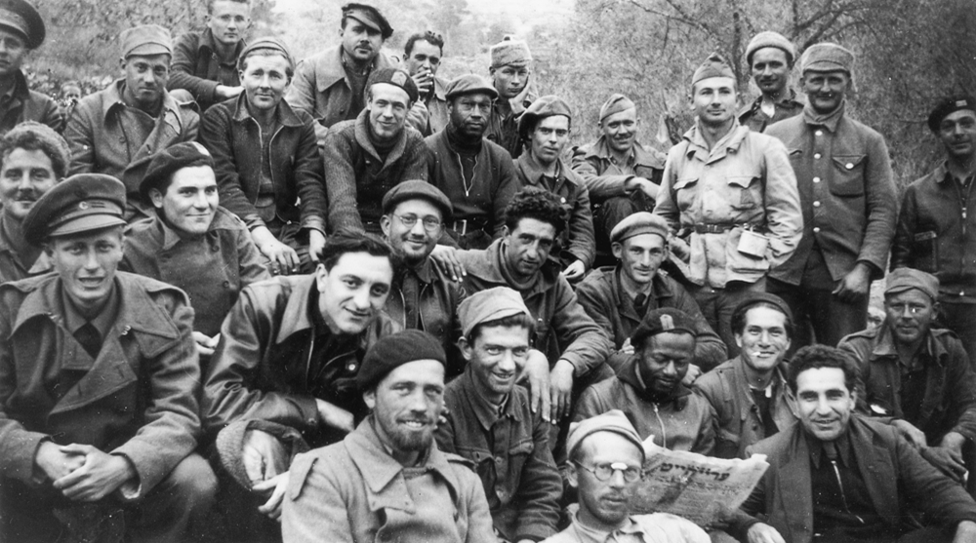Poetry Feature: A Wound in the Heart
 1
1
Mayday, the earth warms, greens, a trumpet on the car radio
bleeds, Miles Davis, Sketches of Spain, the drama of rebirth,
a staccato horn chases the bull in an arena, cycles of disorder.
Here comes the matador, here comes the bull dripping blood
from black shoulder muscle, the red cape hiding the silver sword,
minor keys whipping the animal agony, driving to the fated end.
It was in Spain in the Seventies I first saw the face of fascism,
the Guardia Civil walking in pairs, armed with black pistols,
submachine guns, also in the faces of hotel clerks demanding
passports, holding them for days, just in case…. Forty years fear
under Generalissimo Franco, ally of Mussolini and Hitler, who
bombed Guernica, and beat the elected Republic to a pulp.
I knew little about Spain’s Civil War. My father had showed me
a spiral-bound book of pastel drawings, Republican soldiers in arms.
He had friends who fought in the International Brigades, the famed
Lincoln battalion, and he refused to visit Spain while the dictator lived,
but he understood and forgave why I would go there to meet a woman.
Under a blazing sun, the brass blares, the taunted bull falls to its knees.
2
Spain nestles inside, its tragedy my passion. I collect stories of war,
spoken history of veterans, and now in the 1990s I’m walking streets
in Moscow, or searching in long-lost archives of the Spanish war.
I’ve asked my translator, Galina, what she wanted from America. Jazz,
she says and I bring her a rare vinyl of Sketches, but when I get there,
she admits what she really wants is a Big Mac at Moscow’s McDonald’s.
What has brought the collapse of the Soviet empire lingers in open air—
massive potholes in sidewalks, broken windows and stairwells, two-hour
queues to buy black bread, gas leaks, polluted water, drunks everywhere.
Near Red Square you can watch a steady parade, brides, grooms, kneeling
at an eternal flame for the anti-fascist dead. I’m carrying letters for two
Spanish war veterans who will speak about death in the olive groves.
3
Morris Cohen, Bronx-born (my native land) fought with guerrillas
in Spain, learned tricks of the trade for his life’s work in espionage.
An old brigadista hinted at Cohen’s story, warned me to be careful.
In the heat of the Cold War, FBI ferreting atom bomb spies, Morris
and his wife abruptly disappear from New York. No one knows why,
but when agents break a Red spy ring they find photos of Cohen.
Just as I’m about to fly to Russia, out of the blue I receive a letter
asking me to visit Cohen at a Moscow address. Scary but exciting.
It takes Galina a couple of weeks to muster nerve to accompany me.
I ring the doorbell of a brick building on a quiet, tree-lined street,
out steps a soldier with a weapon strapped to his back, invites us in.
We have found headquarters of Russian intelligence. Galina’s face
drains all color. I show my letter from Cohen, the soldier stomps
upstairs, returns with Boris, who looks me over and promises a reply.
I hadn’t told him where I’m living. Already he knows how to find me.
4
While I wait for his call, I track down another veteran, Percy Ludwig,
tall, gaunt, expert in building fortifications in Spain. Raised in London,
he speaks Cockney, his family Jewish Socialists deported back to Russia.
Percy lives in a huge building, a Brezhnev blockhouse, he quips,
poorly furnished rooms, floors creaky. His wife serves plates of bony fish.
Framed photos show them working artillery during the big war.
They were teachers when Stalin went on an anti-Jew campaign, Percy lost
his job. Now in their eighties, they live in poverty, another side
of Soviet failure. As I leave that night, he flashes his fist in a radical salute.
5
Russian intelligence calls, Boris will take me to Morris Cohen,
resting in a military hospital, late stages of heart failure.
Galina tags along, seriously impressed by my first-class contacts.
In bed, legs swollen, his mind lucid, he asks about old comrades,
talks of a happy childhood in the Bronx, football at Monroe High
and Mississippi, names a friend killed down South for civil rights.
I bring the conversation to Spain, his guerrilla work, setting bombs,
ciphering radio codes. His voice is didactic. In fact, he never stops
talking, as if starved for intimacy in his native language.
I take a chance, hope Boris won’t intervene, ask Morris if he regrets
his life of spying. It was unthinkable, he replies, for one country to
have a monopoly of such terrible weapons. All I want is peace.
Peter Carroll’s “Wound in the Heart” appears in his newest collection of poetry, Talking to Strangers: Poetry of Everyday Life (Turning Point Press, 2022). For copies, see peterncarroll@gmail.com












